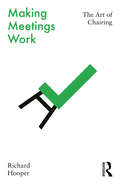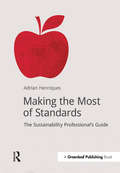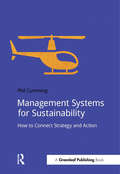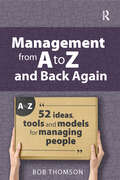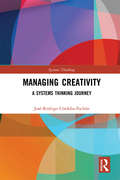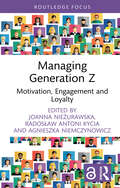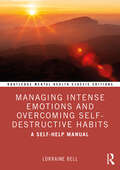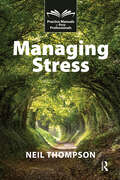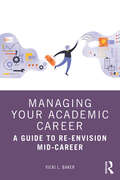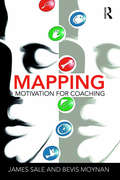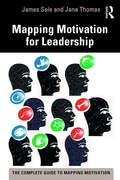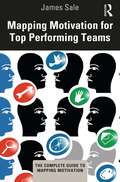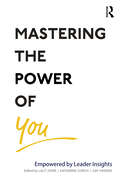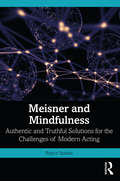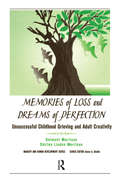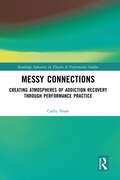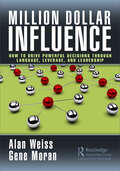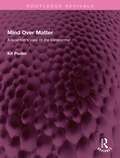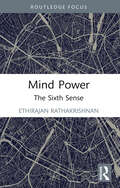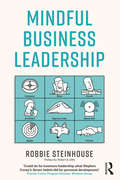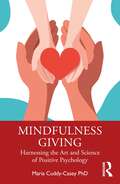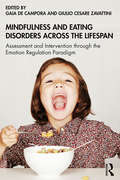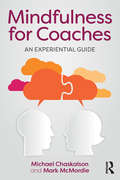- Table View
- List View
Making Meetings Work: The Art of Chairing
by Richard HooperMaking Meetings Work is a short book which aims to help people chair meetings better – meetings of all kinds from community playgroups to conferences and dinners to large corporate Boards. The book is based on the personal experience of a professional working chair over many years. The book is aimed at younger men and women who are beginning to chair their first meetings, and also at more experienced chairs who want to develop their skills.
Making the Most of Standards: The Sustainability Professional's Guide
by Adrian HenriquesThe world of corporate responsibility standards can seem large and confusing. With so many different standards, it is often bewildering. Sustainability standards feed into a broad spectrum of other standards and finding the appropriate standard for your organization's needs is vital. This short book cuts through the confusion. It explains: 1. The pros and cons of using standards to improve sustainability performance 2. The variety of standards out there 3. A map showing how some of the most prominent sustainability standards relate to each other 4. A decision tree to help with choosing the type of standard that will be most helpful to you 5. For some of the most influential standards, a thumbnail description of what they are actually about 6. Some tips for putting standards into practice.
Management Systems for Sustainability: How to Connect Strategy and Action
by Phil CummingTo deliver on your sustainability ambitions, you need an effective management system. Delivery and results, after all, are what sets leading sustainable businesses apart. Supplementing your existing management arrangements with a management systems approach can play a crucial part in helping to implement more sustainable ways of working. It will help your colleagues understand what sustainability means and how it applies to their role. It will strengthen the link between strategy and action and provide the framework for the various elements of your sustainability strategy to happen. In this short guide, Phil Cumming introduces you to management systems thinking and concepts and sets out clear and practical steps to help you be more formalized and systematic about how and when you do things. This book will help you deliver on your sustainability ambitions – without needing to follow a single management system standard!
Management from A to Z and back again: 52 Ideas, tools and models for managing people (Coaching and Mentoring)
by Bob ThomsonThe key themes and ideas in management, from A to Z and back again covered in 52 chapters. Aimed at anyone who is a line manager, project manager or who wants to learn more about management and leadership.From the author of Coaching from A to Z and Back Again, this is ideal for anyone who wants to develop the management skills - of themselves and their employees. Whether you are a line or project manager in an organisation or a student who wants to learn more about management and leadership, this book is perfect for you.Consisting of 52 short, accessible chapters from A to Z and back again, it combines discussion of key ideas, practical management tools and theoretical models. The topics discussed draw on the human and relationship aspects of management and cover the basics of emotional intelligence, self-awareness, leadership and change. Written in a clear and engaging format, this book provides you with a firm foundation in the theory and practice of management and encourages the development of self-management and leadership skills.
Managing Creativity: A Systems Thinking Journey (Systems Thinking)
by José-Rodrigo Córdoba-PachónFor over a century, creativity has unfolded as a valuable field of knowledge. Emerging from disciplines like psychology, management and education, the field of creativity is making strides in others including the arts and engineering. Research and education in this field helped it establish an identity as evidenced by a growing number of courses and specialised journals. However, this progress has come with a price. In a domain like management, institutionalisation of creativity in learning, research and practice has left creativity subordinated to concerns with standardisation, employability and economic growth. Values like personal fulfilment, uncertainty, improvement and connectedness which could characterise systemic views on creativity need to be rescued to promote more and inclusive dialogue between creativity stakeholders. <P><P>The author aims to recover the importance of creativity as a systemic phenomenon and explores how applied systems thinking, or AST, can further support creativity. This demonstrates how creative efforts could be directed to improve quality of life for individuals as well as their environments. The book uses the systems idea as an enquiring device to bring together different actors to promote refl ection and action about creative possibilities. The chapters offer conceptualisations, applications and refl ections of systems ideas to help readers make sense of the field of creativity in academia and elsewhere. Complemented by the author’s own personal, conceptual and practical journey, the insights of the book will act as a vital toolkit for management researchers, career-driven students, practitioners and all creators to define and pursue creative ideas and thrive through their journeys to benefit themselves, other people and organisations.
Managing Generation Z: Motivation, Engagement and Loyalty (Routledge Open Business and Economics)
by Agnieszka Niemczynowicz Radosław Antoni Kycia Joanna NieżurawskaGeneration Z (Gen Z) is the young generation born between the mid-1990s and 2010s. They are now entering the market and starting their first jobs. Therefore, managers must shape the company workplace environment to encourage young employees to work efficiently and connect their future with the company. Only then will both managers and employees share mutual satisfaction from collaboration and aim at the common target, which should be the prosperity of the company. This book presents research results and techniques for analysing the working expectations and needs of Gen Z. The analyses were made in various countries in Europe: The Czech Republic, Latvia, Poland, and Portugal. The book contains chapters that present the analysis results and technical chapters that outline modern methods of analysis of management data, including tutorial chapters on machine learning, which currently makes a strong appearance in research in various disciplines. This volume will be of interest to researchers, academics, practitioners, and students in the fields of management studies, research methods, and human resource management.
Managing Intense Emotions and Overcoming Self-Destructive Habits: A Self-Help Manual (Routledge Mental Health Classic Editions)
by Lorraine BellWhat is emotionally unstable personality disorder (EUPD), also known as borderline personality disorder, and how can people with EUPD learn how to manage their emotions more skilfully and effectively? Managing Intense Emotions and Overcoming Self-Destructive Habits is a self-help manual that will take you through that journey step by step.This book explains the problems that many people with EUPD struggle with, particularly intense emotional states and difficulties regulating them. It also outlines the skills needed to manage them, and explains how these skills can be learnt and developed. Featuring a brand new introduction by the author, subsequent chapters cover themes including: the condition and controversy surrounding the diagnosis drug and alcohol misuse emotional dysregulation and the role of thinking habits and beliefs depression and difficult mood states childhood abuse and relationship difficulties anger management This book is designed to be (ideally) used with the help of professional mental health staff, when a more evidence-based therapy is not available, or the person has tried and not got on with. This support and coaching can be given in a group or by individual sessions.This classic edition is essential reading for people with EUPD and professionals involved in their care—psychologists, psychiatric nurses, social workers, psychiatrists and occupational therapists.
Managing Stress (Practice Manuals for Busy Professionals)
by Neil ThompsonThe Managing Stress Practice Manual, 2nd ed, provides the ideal stress management tool for practitioners across the public sector and professionals at all levels in business and management.The modern world of work is highly pressurised, with stress levels affecting workers' health and little to no understanding of the roots of stress, making workers feel overwhelmed and lacking the confidence to do anything about it. This book takes a holistic look at stress, offering clear and practical guidance on how to manage pressure, how to prevent stress, what to do if stress arises and how to deal with the aftermath of stress. By taking a deeper look, this book provides the reader with a full understanding, taking the narrow focus away from the individual themselves, and thereby taking away the 'blame the victim' message that can add to stress.This latest edition features new content including: current pressures caused by Covid-19, stress related to job insecurity, financial stress and the cost of living crisis issues around neurodiversity. It explains complex ideas clearly and accessibly, including practical examples and exercises throughout, with a repertoire of strategies and sources of help that will be invaluable to practitioners and business professionals alike.
Managing Talent: A Short Guide for the Digital Age
by Mike Rugg-GunnRecruiting, selecting, retaining and developing great people are essential for any successful business. And the combination of digital transformation and post-pandemic work realities presents major challenges for all organisations. This book provides best practice talent management guidance for businesses undertaking digital transformation or facing digital disruption. Taking the reader through the stages of talent acquisition, selection, retention and development, this practical and concise book: sets out, assesses and predicts how the digital revolution impacts talent management practices, and helps the reader navigate the journey from an analogue to a digital organisation; updates talent management concepts and illustrates these with examples and cases of best practice across the business world; and enables senior leaders, talent management professionals and managers to quickly access and implement key learnings through the use of practitioner point summaries and a set of Ten Top Tips in each relevant chapter. The book provides practical insights, grounded in research, into how to manage talent in a fluid and dynamic world of digital change and is aimed at senior leaders and managers, and the HR community. It clearly shows how organisations undertaking a digital journey need to flex and adapt their talent management processes.
Managing Talent: A Short Guide for the Digital Age
by Mike Rugg-GunnRecruiting, selecting, retaining and developing great people are essential for any successful business. And the combination of digital transformation and post-pandemic work realities presents major challenges for all organisations. This book provides best practice talent management guidance for businesses undertaking digital transformation or facing digital disruption. Taking the reader through the stages of talent acquisition, selection, retention and development, this practical and concise book: sets out, assesses and predicts how the digital revolution impacts talent management practices, and helps the reader navigate the journey from an analogue to a digital organisation; updates talent management concepts and illustrates these with examples and cases of best practice across the business world; and enables senior leaders, talent management professionals and managers to quickly access and implement key learnings through the use of practitioner point summaries and a set of Ten Top Tips in each relevant chapter. The book provides practical insights, grounded in research, into how to manage talent in a fluid and dynamic world of digital change and is aimed at senior leaders and managers, and the HR community. It clearly shows how organisations undertaking a digital journey need to flex and adapt their talent management processes.
Managing Your Academic Career: A Guide to Re-Envision Mid-Career
by Vicki L. BakerThe definitive resource for mid-career professionals in the academy, this book provides a step-by-step guide to re-imagining the mid-career stage, regardless of career goals, whether aiming for full professorship or an administrative path, drawing on higher education, organizational studies, and human resource fields. Essential guidance for scholars of faculty work, faculty developers, mid-career faculty members, and institutional leaders to build a strong foundation to design a diversified portfolio of mid-career stage programming is assured. The stories, examples, literature, and resources shared throughout this comprehensive work will provide inspiration, and reality checks, to mid-career faculty and the individuals charged with better supporting them. Readers will be able to: Identify their career (or departmental/institutional) goals and next steps Determine the gaps in needed skills, tools, and experiences to support goal achievement as next steps are pursued Manage the process of taking newfound skills, tools, strategies, and resources to arrive at the intended destination. Higher education faculty, administrators, and other academic leaders will be empowered to take control of the mid-career stage by using the resources, strategies, and tools offered throughout the book to build, implement, and assess a robust mid-career faculty development program.
Mapping Motivation for Coaching (The Complete Guide to Mapping Motivation)
by James Sale Bevis MoynanMapping Motivation for Coaching, co-written with Bevis Moynan, is the first of a series of six books that are all linked to the author's Motivational Map toolkit. Each book builds on a different aspect of personal, team, and organisational development. This book is a practical guide to understanding how personal and career development is underpinned by motivation, and how coaching and mapping are perfectly complementary activities. More specifically, it shows how using Motivational Maps within an accepted coaching framework can not only accelerate the process in order to achieve results for the client more quickly, but also go deeper, both in mutual understanding and also the possibility of facilitating a successful outcome; for the client not only needs to understand their issue more effectively through the coaching process, but also needs to be motivated to want to take significant action to deal with it. Understanding, then, is one thing, but having the energy for follow-through is another, and it is precisely in this area that combining Maps with coaching techniques is so powerful. This highly original approach will enable all coaches everywhere in the world to get into the heart of their clients’ issues faster, better, and be able to help them solve these issues more easily.
Mapping Motivation for Leadership (The Complete Guide to Mapping Motivation)
by Jane Thomas James SaleMapping Motivation for Leadership, co-written with Jane Thomas, is the fourth of a series of seven books that are all linked to the author’s Motivational Map toolkit. Each book builds on a different aspect of personal, team and organisational development. This is a practical guide to leadership in the 21st century and builds on the ‘4+1’ model outlined in the author's original book Mapping Motivation: Unlocking the Key to Employee Energy and Engagement. There is an increasing body of evidence, that the single most important aspect of being a leader relates to managing emotions effectively, and this management goes way beyond simply ‘understanding’ emotional intelligence; it is in fact a practice and one that is intimately connected with personal development and growth, and with energy. Energy, as Mapping Motivation made clear, is synonymous with motivation. The effective leaders of tomorrow will be those who understand their motivators, who regularly measure their motivators, sustain and replenish and maximise their motivators, and who do the same for their employees. Clearly, there is a link here with the book on engagement, for leaders who do so will engage their employees. However, this book not only covers the motivational side of leadership, but also explores in detail the skill sets necessary in the ‘4+1’ model: thinking skills, action skills, team skills and motivational skills plus that indefinable ‘something’ that is a commitment to personal development, so that we as leaders are not trying to solve today’s problems with yesterday’s training as our only internal resource.
Mapping Motivation for Top Performing Teams (The Complete Guide to Mapping Motivation)
by James SaleMapping Motivation for Top Performing Teams is the final volume in a series of books that are all linked to the author's Motivational Map toolkit. Each book builds on a different aspect of personal, team and organisational development. This book, using the Motivational Map, the Team Motivational Map, as well as the Organisation Motivational Map, is a practical guide to understanding how team dynamics and success are hugely influenced by motivational factors, which are not usually taken into account. The book is a deeper exploration of team mapping which occurs in Chapter 6 of Mapping Motivation (2015), Chapter 6 of Mapping Motivation for Engagement (with Steve Jones, 2019), and Chapter 6 of Mapping Motivation for Leadership (with Jane Thomas, 2020). But whereas these chapters only touched on specific aspects of team dynamics, this book covers the issues more comprehensively; it also attempts to avoid replication of materials, although there are bound to be small overlaps. It covers not only how motivations affect team productivity and how this can be boosted through targeted Reward Strategies, but also how ‘mapping’ provides profounder insights into the four key characteristics of top performing teams: the clear remit, vital interdependency, strong belief, and real accountability. How Motivational Maps covers these areas, we believe to be original, eye-opening and effective in the management of change. Further, as always with Motivational Maps, its language and metrics raise self-awareness at an individual and team level, and so can help resolve conflicts through its common and non-judgmental language. Managing teams is the key skill of managers: thus this book is a handbook for managers everywhere who wish to excel at management, for without bringing their teams on board (i.e. motivating their teams), they are not effectively managing.
Mastering the Power of You: Empowered by Leader Insights
by Gay Haskins Lalit Johri Katherine CorichThe world of the 2020s is complex and demanding. We are faced with a myriad of difficult decisions about our present and future, driven by the impact of the COVID-19 pandemic, the economic downturn, rising unemployment and inequalities, digital disruption, uncertain political environments, and climate change. In this book, leaders from around the world share their experiences in adapting to the changing world and the lessons they have learnt. They offer advice on mastering a diverse range of leadership concepts, skills, and behaviours to prepare for the challenges of the 21st century. The easy-to-follow format is grouped around the core concepts of Leadership, entrepreneurship, and volunteering; Purpose and values; Authenticity, trust and presence; Strategising, thinking, and decision-making; Mentoring and development; Mental resilience; Diversity and inclusion; Negotiating and collaborating; and Social and environmental impact. Each of the 32 chapters takes you on a voyage of discovery to a wide range of "powers" and inspires you to use them to open new opportunities in your life and workplace. If you are a recent graduate aspiring to gain meaningful employment in a rapidly transforming workplace, or a mid-career professional whose job may soon change or disappear with increasing automation, this book is for you. If you are a consultant, coach, mentor, or trainer, looking for new approaches, this book will provide valuable guidelines. If you are a seasoned professional navigating the new norms, this book will give you many inspiring insights.
Meisner and Mindfulness: Authentic and Truthful Solutions for the Challenges of Modern Acting
by Royce SparksMeisner and Mindfulness: Authentic and Truthful Solutions for the Challenges of Modern Acting is the first book that reveals how Meisner and mindfulness can be united to create strong results for actors and help them navigate the challenges of the digital age. The twenty-first century has created an entirely new set of demands and pressures on the working actor, including an acceleration of the digital age and the complications of COVID-19, which have led to auditions, rehearsals, and even whole performances happening entirely in isolation. This book combines a modern rethinking of the Meisner technique with a complementary set of tools from mindfulness meditation to offer profound solutions to these growing challenges, addressing the demands of a post-coronavirus industry as well as the pressures of acting in the digital era. In this ground-breaking expansion of the technique, readers will discover how it is possible to train some of the deepest values of living truthfully under a given set of circumstances, both with other actors and whilst alone. Since the 1950s the Meisner technique has aided the actor in navigating the demands unique to their time. This book is a powerful reminder that, even in the midst of so many changes and challenges, the truthfulness that has defined outstanding performances across generations is still within reach. Full of easily accessible mindfulness and Meisner exercises and principles for practice-based support, Meisner and Mindfulness will be illuminating to working actors, directors, students and instructors of acting, and practitioners of the Meisner technique looking to develop the authenticity, immediateness, and closeness essential to great acting. The book also includes access to an online supplement featuring additional exercises and concepts, including new ways to incorporate Meisner exercises into training sessions, suggestions for how Meisner-oriented companies can use exercises such as repetition in rehearsals, and discussions for how to set up a facilitated Meisner group.
Memories of Loss and Dreams of Perfection: Unsuccessful Childhood Grieving and Adult Creativity
by Delmont C Morrison Shirley Linden MorrisonWith "Memories of Loss and Dreams of Perfection", Delmont and Shirley Morrison have made an impressive contribution to psychology and to the appreciation of literature by demonstrating the ways in which a children's imaginative play can help them cope with the tragic early loss of beloved family members and by tracing how such early play processes form the basis for adult creativity. Their book is unique in that it: presents new ideas and expands our understanding of the complex interrelationships among loss, child development and creativity, and presents clinical cases of play therapy and case studies of creative adults to illustrate theory and concepts. The Morrisons incorporate scientific research, clinical case studies, and biographies in a manner that provides a deeper understanding of the fiction of Emily Bronte, J.M. Barrie, Jack Kerouac and Isak Dinesen. Readers will be deeply touched and moved to self-exploration by the humanity and sensitivity of this fine book.
Messy Connections: Creating Atmospheres of Addiction Recovery Through Performance Practice (ISSN)
by Cathy SloanThis book examines performance practices that involve people in recovery from addiction, theorising such practices as recovery-engaged.Focusing on examples of practice from a growing movement of UK-based recovery arts practitioners and performers, it highlights a unique approach to performance that infuses an understanding of lived experiences of addiction and recovery with creative practice. It offers a philosophy of being in recovery that understands lived experience, and performance practice, as a dynamic system of interrelations with the human and nonhuman elements that make up the societal settings in which recovery communities struggle to exist. It thereby frames the process of recovery, and recovery-engaged performance, as an affective ecology – a system of messy connections. Building upon ideas from posthumanist research on addiction, cultural theory on identity and new materialist interpretations of performance practice, it considers how such contemporary theory might offer additional ways of thinking and doing arts practice with people affected by addiction. The discussion highlights the distinct aesthetics, ethics and politics of this area of performance practice.This study will be of great interest to students and scholars in Applied Theatre and Critical Arts and Mental Health studies.
Million Dollar Influence: How to Drive Powerful Decisions through Language, Leverage, and Leadership
by Alan Weiss Gene MoranEven senior people, business owners, and board members are unaware of the nuances of influence on a daily basis. They think in a straight line and try to "strike deals," use hierarchical power, make "trade-offs," or bargain as if at a flea market. They unwittingly sacrifice vital needs to gain minor and temporary bright, shiny things. Influence is not about fast-talking, it’s about fast-thinking and carefully constructed language that one applies within a specific context. Influence is thought to be programmable—that is, it can create scarcity or consistency of positive responses. In reality, it’s about accountability, innovation, and leverage. No pre-pandemic strategy is worth a cent in a post-pandemic world. There is no "new normal" or "return to normal." There are only new realities. In this book, one of the boldest, most aggressive, most successful consultants in the world makes his predictions and provides recommendations that may frighten and stun, but ultimately can lead to market domination. Million-dollar influencers understand that influence doesn’t mean kissing up to everyone. While we may all be equal as human beings, not everyone has a stake in the outcomes in the business of influence. Some will resist change for the sake of resisting change. They lack imagination or let fear hold them in place. Recognizing actual stakeholders will guide your positioning of stakes in the ground that will mark critical positions leading to your desired outcome. Features How consensus building is something to live with, not something to die for The fundamental difference between accountability and authority The need for innovation and even improvisation in wielding influence The scientific and magical contrasts of language How to effectively maneuver within political environments How to rally the right stakeholders at the right time The powerful role of consequence
Mind Over Matter: A scientist's view of the paranormal (Routledge Revivals)
by Kit PedlerFirst published in 1981, Mind Over Matter stems from Kit Pedler’s TV series of the same name and is an engrossing, open-minded survey of all aspects of the paranormal. It controversially suggests that metal-bending, telepathy, precognition and out-of-body experiences may not after all be the domain of frauds alone. Although criticised over the years, the book still fills the readers with creativity and wonder, and maybe even provides some explanation for inexplicable events in life.
Mind Power: The Sixth Sense
by Ethirajan RathakrishnanThis book explores the mysteries of the human brain and the potential of the mind. The peculiarities and infinitude of the mind have been a theme for research for scientists and philosophers alike, for centuries. This volume presents the unanswered and highly convoluted questions and hypotheses surrounding the human mind in a simplified way. It examines the binaries of religion and science, god and nature and emotions and intelligence through a philosophical lens to posit that the relationships between cognition, belief, nature and science are what we understand and infer based on our surroundings and how much we are willing to think, learn and introspect.This book will be of interest to students of philosophy, psychology, science, popular science, psychoanalysis, cognitive studies and mental health. It will also appeal to general readers.
Mindful Business Leadership
by Robbie SteinhouseMindful Business Leadership presents a new model of leadership. It introduces ten very different leadership roles that are required to meet the challenges of modern business. Memorable metaphors and images are created for each, and they are placed in a matrix. Readers are shown how to develop these roles within themselves. Potentially negative aspects of each are discussed, along with material on how to put these to creative use. The book argues that mindfulness is the best way to balance the roles – a mindful leader will know ‘who to be’ in any situation. The last part is taken up with clear, practical exercises that readers can practice to become more fully mindful and develop a clear vision for their own leadership. Mindful Business Leadership is relevant to anyone, anywhere in the world, who is moving (or wishes to move) to a position of leadership.
Mindfulness Giving: Harnessing the Art and Science of Positive Psychology
by Maria Cuddy-CaseyThis accessible book offers a unique, evidence-based perspective on the art and science of giving. It combines concepts from psychology, neuroscience and social science theory with stories from interviewees on their experiences as a giver and receiver.This book offers a holistic overview of the reciprocal aspects of giving, strategies for selecting a recipient of a gift in a never-ending sea of need, and a guide to developing one’s personal philosophy, boundary, and plan on giving. As people seek to reconnect and find meaning, this book offers a venue for exploration. Covering topics such as empowering children to give, the financial considerations of giving, compassion fatigue and how to set healthy boundaries, this book helps readers think about unique ways of giving. Through the use of action plans and worksheets, readers are encouraged to consider their own place in giving, empower themselves as a change agent, and recognize the positive social power and ripple effect of giving.Mindfulness Giving is valuable reading for students of positive psychology, social and health psychology, social work, and sociology, as well as professionals and coaches working in self-improvement and self-care.
Mindfulness and Eating Disorders across the Lifespan: Assessment and Intervention through the Emotion Regulation Paradigm
by Gaia De CamporaThis important and well researched volume examines the clinical phenomenon of eating disorders, exploring their longitudinal risk trajectory and introducing the Mindful Emotion Regulation – Approach (MER-A) as a starting point for intervention. The book reviews various eating problems that can originate from the earliest perinatal phase to early adolescence, and through the MER-A framework focuses on how the principles of mindfulness and the related theoretical and clinical bases underlying the construct of emotional regulation can guide the clinician to a deeper understanding of a patient’s disordered eating. Featuring reflections on clinical cases, it includes coverage of patients’ difficulties in regulating emotions, their relationships with various eating behaviours and their associated interpersonal features. Mindfulness and Eating Disorders across the Lifespan represents an attempt to provide a complete appreciation of this complex and multifaceted topic, making it of great importance to psychotherapists and related mental health professionals working with eating disorders.
Mindfulness for Coaches: An experiential guide
by Michael Chaskalson Mark McMordieMindfulness for Coaches accessibly presents theory and research on the benefits of mindfulness training and explores how mindfulness can feature in coaching work. Michael Chaskalson and Mark McMordie explain how coaches can use mindfulness to become more deeply attuned to themselves and to clients, and to create transformational resonance. The authors present a systematic methodology to cultivate and embody a way of being that enables growth and transformation in oneself and in others. The first book of its kind, Mindfulness for Coaches provides an experiential guide, inviting and supporting coaches to engage with the programme included, sharing new qualitative research into the potential impact of mindfulness on coaching process and outcomes, and explicitly linking mindfulness practice to global standards of coaching mastery. Presented in two parts, the book first outlines a unique eight-week programme, Mindfulness for Coaches, and goes on to clarify the links between mindfulness, coaching mastery and different coaching approaches, share insights from the fields of psychotherapy, leadership and organisation development, and provide guidance for further learning. Mindfulness for Coaches will be insightful and inspiring reading for coaches in practice and in training, coaching psychologists and academics and students of all coaching modalities.
